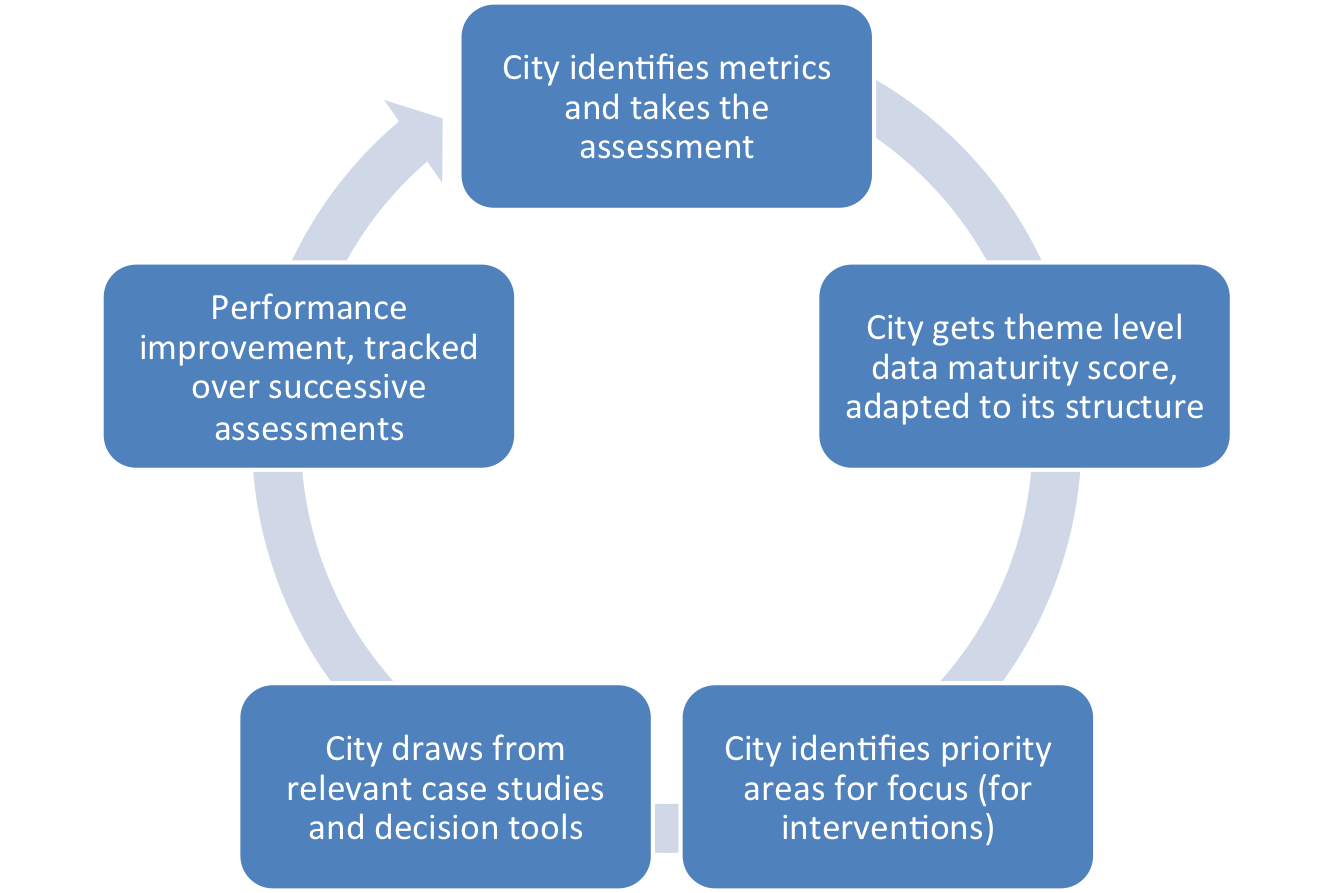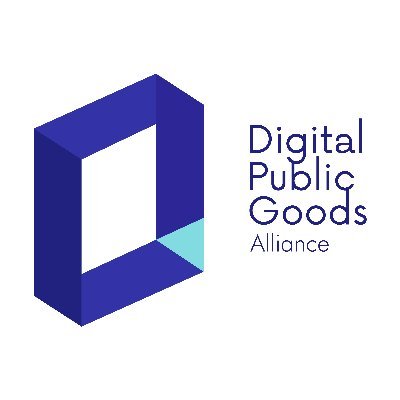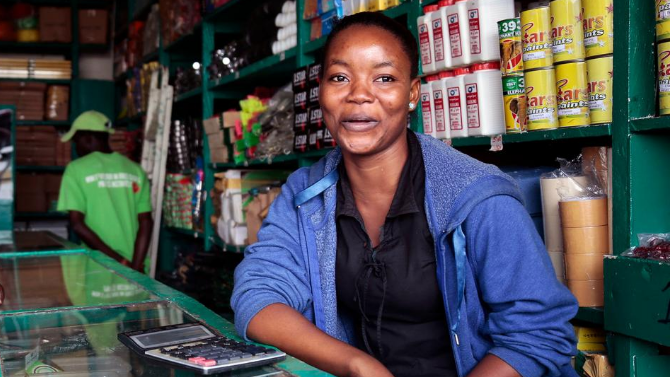A Deep-Dive into the Cities Data Toolkit
Development Gateway and Athena Infonomics were present at the Cities Alliance workshop in Accra, Ghana last week where over 150 participants convened to share lessons learned and discuss key issues to help support cities and the urban transition in Africa. The Promoting the Role of Cities: Africa Strategy Workshop has been rich with discussions, debates, and dialogues as to what actions are needed to successfully support the continent’s rapid urbanization.
As part of the workshop, we had the pleasure to present our Data Toolkit project, which has been developed in conjunction with Athena Infonomics for Cities Alliance as part of the Future Cities Africa (FCA) Initiative to serve as a one-stop-shop manual for city officials regarding data use for city planning. It focuses on supporting cities to create a process for data management as well as identifies opportunities for a city to improve its data maturity. The Data Toolkit supports a city’s data management life cycle and be can used iteratively and comparatively to support a city’s data needs for day-to-day operations. The Data Toolkit is one of the many tools developed under the FCA Initiative to help support cities in actively and effectively managing their city’s growth and planning processes.
Our previous posts on our Cities Alliance-funded toolkit, as part of the DfID-funded Future Cities Africa Initiative, looked at the innovation approach we have employed in developing out this resource for city officials worldwide. But in light of the conference and its upcoming roll-out, we wanted to take the opportunity to dive more deeply into what the Toolkit offers and answer some FAQs regarding what it can do and what it offers to city officials.
Why was this toolkit developed?
One of the main goals of the Future Cities Africa Initiative is to help make cities future-proofed, e.g. resilient in the wake of unexpected shocks and able to harness and equalize their economic development. With this aim in mind, there are currently no clear resources or mandates out there for cities to understand what are effective city data management and planning strategies and pathways. Also, there is no commonly agreed upon road-map for what cities should, and should not be, doing for their planning processes. Data-driven decision-making can help to make cities more knowledgeable — and therefore more effective — in their planning outcomes. But without resources to support this ambition, the pathway to achieving data-driven decisions is both unclear and unstandardized.
Why now?
Africa, particularly Sub-Saharan Africa, is rapidly urbanizing: by 2030 most of Sub-Saharan Africa will be predominantly urban. But urbanization is complex and challenging. Lack of proper devolution, rapid population growth, and environmental shocks all threaten a city’s capacity to manage growing needs. Thus, the issue of available knowledge resources appears again. There is a clear need for better planning but currently no resources for how to achieve that.
But is this just a donor vision? Or do local officials feel the same way?
As part of developing the Toolkit, we made an active effort to talk about our approach and ground-truth it with governments in Ghana, Uganda, Ethiopia, and Mozambique. We also conducted two field visits to Ghana and Uganda which helped to illuminate important areas of considerations, challenges that we needed to keep in mind, and the opportunities for the uptake of a resource such as this Toolkit. In sum, local officials were very interested in having the Toolkit become a part of their city data management processes, as they could see the value-add it could offer to their work.
What is unique about our data toolkit?
There are several aspects about our Toolkit that make it unique and, more importantly, relevant.
- It is the first resource of its kind for city officials. As mentioned previously, city officials currently do not have a resource such as the Toolkit to itemize how to build up a data management process, nor the tools to do so.
- It does not assume a baseline. Any city can use this as a resource, regardless of where it sits on the data maturity spectrum. From a city that has a fully fledged data management plan in place to one where data processes are weak, the Toolkit helps to build up and refine a city’s data maturity from its current starting point.
- It does not look at data in isolation of the reality. The Toolkit places heavy emphasis on understanding the enabling and structural context of a city so that recommendations and action plans are created based off of what is currently achievable for a city. This is key in ensuring that cities are able to make consistent progress in growing their data management and data maturity processes.
- It allows for cities to own their data process. The Toolkit serves as a benchmark and compilation of best practices rather than a set of prescriptions and rules so that cities retain the flexibility of forming their own pathways, as best suited to their needs, to achieve their data management goals.
- It is comparative but does not replace judgment. Cities can use the toolkit and compare scores with others but there is no standardized ranking. Thus, cities can either use this Toolkit as an internal resource, or as means to compare their results with other cities to identify areas of differences and improvement.
What does our Toolkit include?
- Two sets of indicators – basic and advanced – that cities can use as a framework for which indicators to collect in order to have a comprehensive data ecosystem.
- Data maturity self-assessments. The Toolkit includes three self-assessments – Data Quality, Structural, and Enablers – that can be used to assess a city’s current state of data quality, the structural aspects at play regarding the city-state relationship, and the bottlenecks in place that are impeding data maturity. The self-assessments are meant to be used iteratively to continuously develop a city’s overall data maturity.

Figure 1: Data maturity self-assessments
- Optimal approaches for governance transformations and data maturity improvements are included to help cities identify how to tackle and improve issues in their data ecosystem.
- A portfolio of available decision support tools is also available to help cities take their data maturity one step further, by refining and focusing on improving planning processes in specific areas.
- A walk-through of what success looks like, so that cities can monitor and evaluate the effectiveness of the Toolkit.
What are the next step for the Toolkit?
The next step for the Toolkit is to get it out there and have people use it! The resounding feedback during the Cities Alliance Workshop was that city officials wanted to see how the Toolkit would help them in their day-to-day work – from improving the cost-effectiveness and impact of sanitation funding to increasing tax revenue generation – there was a clear need and demand for understanding metadata and using it to inform more sector-specific planning decisions.
In addition, integrating the Toolkit with other Cities Alliance tools such as resilience.io and the City Development Strategy could be a potential opportunity to maximize the linkages and synergies between all the Cities Alliance tools.
Interested in learning more or collaborating to this work?
Please do contact us! We would love to hear your insights and talk.
Image: Cliff Hellis CC BY-NC-ND 2.0
Share This Post
Related from our library

DG’s Open Contracting Portal Designated as a Digital Public Good
Digital Public Goods Alliance designated DG’s Open Contracting Portal as a digital public good in September 2022. The Portal provides procurement analytics that can be used to improve procurement efficiency and, in turn, reduce corruption and increase impact.

To Enable W-SMEs to Thrive in Côte d’Ivoire We Start by Listening to their Data and Digital Needs
This blog is co-written by Development Gateway’s Aminata Camara, Senior Consultant; Kathryn Alexander, Senior Program Advisor; and MCC‘s Agnieszka Rawa, Managing Director of Data Collaboratives for Local Impact (DCLI). On June 28th, 2021, MCC, USAID, Microsoft, Thinkroom, and Development Gateway will be co-hosting a workshop to share, validate, inform, and build on recent research on

Artificial Intelligence: A Silver Bullet or Scrap Metal for Global Development?
When someone mentions artificial intelligence (AI), it’s easy to conjure up two conflicting images: the first, killer robots whizzing past, replacing human jobs, daily tasks, and social interactions in a post-apocalyptic world; the second, a C-3PO-esque personality revolutionizing our health and food systems. Pondering this, we are also inclined to explore the question, where does